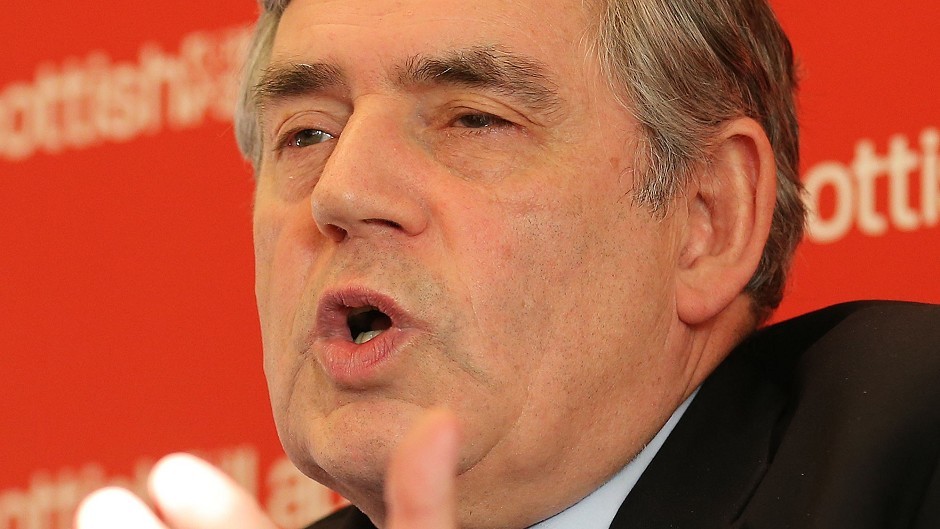Former Prime Minister Gordon Brown has urged unionist parties to agree on a programme of further powers for Holyrood to ward off the threat of a Yes vote.
The Labour MP claimed a joint prospectus would “unite sensible opinion” among people who want change but are not in favour of full independence.
Mr Brown said powers over training, employment, land reform, environment and the railways should be devolved to Holyrood.
He said MSPs should be given the opportunity to introduce an upper band of council tax, a millionaire tax on stamp duty and a upper rate of income tax.
Mr Brown, who was accompanied by Scottish Labour leader Johann Lamont and other senior MPs and MSPs, said the agenda promoted by the party ensure the country never faced a poll tax, bedroom tax or rail privatisation again.
Speaking in Edinburgh, the MP said: “We are opening a new front in the referendum campaign – it is positive and it is about social justice.
“It contains proposals that are capable of being delivered almost immediately – it is a programme that could unite the vast majority of the people of Scotland.
“While people want a strong Scottish Parliament and want it to have more powers, they also want to maintain and retain the benefit of sharing and pooling resources across the UK.
“I think people in Scotland are now looking for a platform and a programme of policies that will unite them, rather than divide them and will mean people can work together in future rather than feel they are trapped in divisions and divisiveness that they cannot escape.”
Mr Brown said Labour had identified 10 issues which it believed that the majority of Scots would support because it would ensure the strongest possible Scottish Parliament and the maximum amount of devolution.
He claimed all party support and agreement would make it possible for the “early delivery of big changes in the constitution”.
Mr Brown said: “These measures, I believe, can agreed between the parties and put in legislation as soon as practical.”
The MP said the SNP would never be able to claim nothing would change in Scotland in the event of a “no” vote.
Mr Brown said: “It is inevitable with the agreement between the parties that we could get the early delivery of the proposals.”
But former Scottish Labour Party chairman, Bob Thomson, who supports independence, dismissed Mr Brown’s ideas.
“As a Labour Party member, I could not disagree with Gordon Brown and Johann Lamont more,” he added.
“Many Labour voters and members are realising that the Scottish Parliament offers a much better way of making sure that the wealth of Scotland works for the people of Scotland than Westminster ever has.
“Instead of being on the receiving end of Tory governments Scotland didn’t vote for, a re-balancing of economic power in these islands away from the over-dominance of London would be of benefit both north and south of the border.
“Labour voters also seeing that the powers offered by the ‘no’ campaign parties don’t go far enough in being able to transform Holyrood from a parliament able to mitigate harmful UK government policies to one that can create a fairer, prosperous and more just society.”
A Scottish Liberal Democrat spokeswoman said Labour’s aspirations for the future were consistent with proposals for additional powers outlined in a report written by MP Sir Menzies Campbell.
“All three pro-UK parties are committed to delivering more powers in the event of a ‘no’ vote in September,” she added.
“This is an interesting contribution which is much in line with the principles of the Campbell II report.”
The Conservative Strathclyde Commission on the Future Governance of Scotland was published on Monday and the key proposal is to give Holyrood almost full control over income tax.
A Conservative party spokesman said: “Assuming we get back in after the general election next year we will be looking to try and get these proposals through Westminster and Holyrood.”
Prime Minister David Cameron said a consensus on giving more powers to Scotland if it rejects independence could be achieved soon after the 2015 general election.
